人教版新目标英语九年级-Unit10单元知识点小结学习资料
Unit10知识重点总结 人教版新目标 英语九年级全册
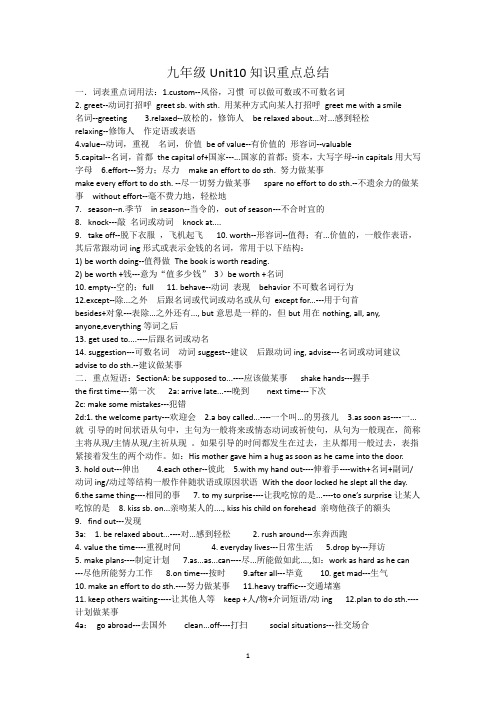
九年级Unit10知识重点总结一.词表重点词用法:1.custom--风俗,习惯可以做可数或不可数名词2.greet--动词打招呼greet sb. with sth. 用某种方式向某人打招呼greet me with a smile名词--greeting 3.relaxed--放松的,修饰人be relaxed about...对...感到轻松relaxing--修饰人作定语或表语4.value--动词,重视名词,价值be of value--有价值的形容词--valuable5.capital--名词,首都the capital of+国家---...国家的首都;资本,大写字母--in capitals用大写字母6.effort---努力;尽力make an effort to do sth. 努力做某事make every effort to do sth. --尽一切努力做某事spare no effort to do sth.--不遗余力的做某事without effort--毫不费力地,轻松地7.season--n.季节in season--当令的,out of season---不合时宜的8.knock---敲名词或动词knock at....9.take off--脱下衣服,飞机起飞10. worth--形容词--值得;有...价值的,一般作表语,其后常跟动词ing形式或表示金钱的名词,常用于以下结构:1)be worth doing--值得做The book is worth reading.2)be worth +钱---意为“值多少钱”3)be worth +名词10.empty--空的;full 11. behave--动词表现behavior不可数名词行为12.except--除...之外后跟名词或代词或动名或从句except for...---用于句首besides+对象---表除...之外还有..., but意思是一样的,但but用在nothing, all, any, anyone,everything等词之后13.get used to....----后跟名词或动名14.suggestion---可数名词动词suggest--建议后跟动词ing, advise---名词或动词建议advise to do sth.--建议做某事二.重点短语:SectionA: be supposed to...----应该做某事shake hands---握手the first time---第一次2a: arrive late...---晚到next time---下次2c: make some mistakes---犯错2d:1. the welcome party---欢迎会 2.a boy called...----一个叫...的男孩儿 3.as soon as----一...就引导的时间状语从句中,主句为一般将来或情态动词或祈使句,从句为一般现在,简称主将从现/主情从现/主祈从现。
人教版九年级英语全册Unit10知识点
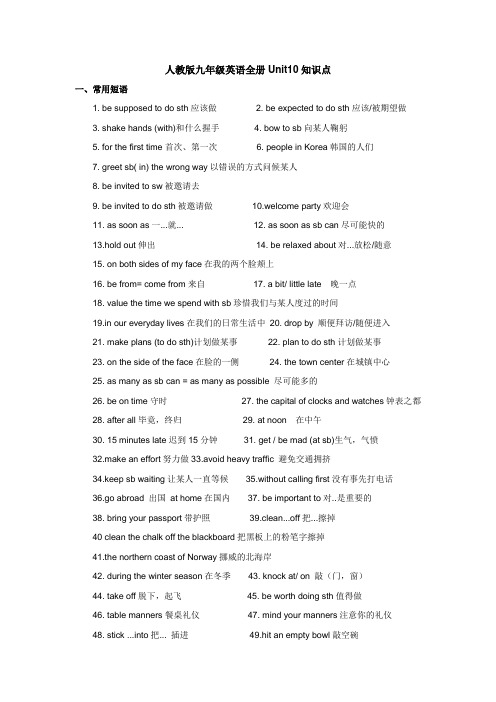
人教版九年级英语全册Unit10知识点一、常用短语1. be supposed to do sth应该做2. be expected to do sth应该/被期望做3. shake hands (with)和什么握手4. bow to sb向某人鞠躬5. for the first time首次、第一次6. people in Korea韩国的人们7. greet sb( in) the wrong way以错误的方式问候某人8. be invited to sw被邀请去9. be invited to do sth被邀请做10.welcome party欢迎会11. as soon as一...就... 12. as soon as sb can尽可能快的13.hold out伸出14. be relaxed about对...放松/随意15. on both sides of my face在我的两个脸颊上16. be from= come from来自17. a bit/ little late 晚一点18. value the time we spend with sb珍惜我们与某人度过的时间19.in our everyday lives在我们的日常生活中20. drop by 顺便拜访/随便进入21. make plans (to do sth)计划做某事22. plan to do sth计划做某事23. on the side of the face在脸的一侧24. the town center在城镇中心25. as many as sb can = as many as possible 尽可能多的26. be on time守时27. the capital of clocks and watches钟表之都28. after all毕竟,终归29. at noon 在中午30. 15 minutes late迟到15分钟31. get / be mad (at sb)生气,气愤32.make an effort努力做33.avoid heavy traffic 避免交通拥挤34.keep sb waiting让某人一直等候35.without calling first没有事先打电话36.go abroad 出国at home在国内37. be important to对..是重要的38. bring your passport带护照39.clean...off把...擦掉40 clean the chalk off the blackboard把黑板上的粉笔字擦掉41.the northern coast of Norway挪威的北海岸42. during the winter season在冬季43. knock at/ on 敲(门,窗)44. take off脱下,起飞45. be worth doing sth值得做46. table manners餐桌礼仪47. mind your manners注意你的礼仪48. stick ...into把... 插进49.hit an empty bowl敲空碗50. point at指着, point to指向(侧重方向51. at the table在餐桌旁52 at table在吃饭53.basic table manners基本的餐桌礼仪54. my biggest challenge我最大的挑战55. on my student exchange program在我的交换生生56.there is no reason to do sth没原因做57. go out of one’s way (to do sth.)特地做某事, 格外努力做58.make sb feel at home使某人感到宾至如归59. a teenage granddaughter一个十几岁的(外)孙女60. talk to sb in French用法语和...交谈61.be comfortable doing舒服/轻松做某事62.behave well/ badly/ politely举止好63. behave oneself举止规矩64. as you can imagine正如你想象的那样65. be different from与...不同66.be / get used to sth习惯于某事be / get used to doing sth.习惯于做某事67. gradually get used to sth逐渐习惯某事68. cut it up把它切开69. eat it with a fork用叉子吃它70.put your elbows on the table把肘部放在桌子上71. have a safe trip一路平安,旅途愉快72. show up 出席,露面,到场二、短语用法集锦1.(1)suppose:猜想;假设suppose that表示“猜测;假设”,that可省例:I suppose he is a student.(2)be supposed to do sth被期望做某事,应该做某事。
人教版新目标英语九年级的-Unit10单元知识点小结.doc
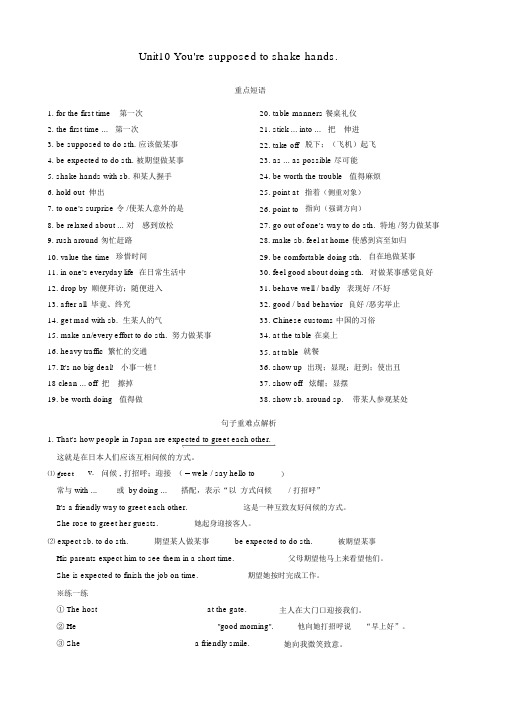
Unit10 You're supposed to shake hands.重点短语1. for the first time 第一次20. table manners 餐桌礼仪2. the first time ... 第一次21. stick ... into ... 把伸进3. be supposed to do sth. 应该做某事22. take off 脱下;(飞机)起飞4. be expected to do sth. 被期望做某事23. as ... as possible 尽可能5. shake hands with sb. 和某人握手24. be worth the trouble 值得麻烦6. hold out 伸出25. point at 指着(侧重对象)7. to one's surprise 令 /使某人意外的是26. point to 指向(强调方向)8. be relaxed about ... 对感到放松27. go out of one's way to do sth. 特地 /努力做某事9. rush around 匆忙赶路28. make sb. feel at home 使感到宾至如归10. value the time 珍惜时间29. be comfortable doing sth. 自在地做某事11. in one's everyday life 在日常生活中30. feel good about doing sth. 对做某事感觉良好12. drop by 顺便拜访;随便进入31. behave well / badly 表现好 /不好13. after all 毕竟、终究32. good / bad behavior 良好 /恶劣举止14. get mad with sb. 生某人的气33. Chinese customs 中国的习俗15. make an/every effort to do sth. 努力做某事34. at the table 在桌上16. heavy traffic 繁忙的交通35. at table 就餐17. It's no big deal! 小事一桩!36. show up 出现;显现;赶到;使出丑18 clean ... off 把擦掉37. show off 炫耀;显摆19. be worth doing 值得做38. show sb. around sp. 带某人参观某处句子重难点解析1. That's how people in Japan are expected to greet each other.这就是在日本人们应该互相问候的方式。
人教版英语九年级unit10知识点
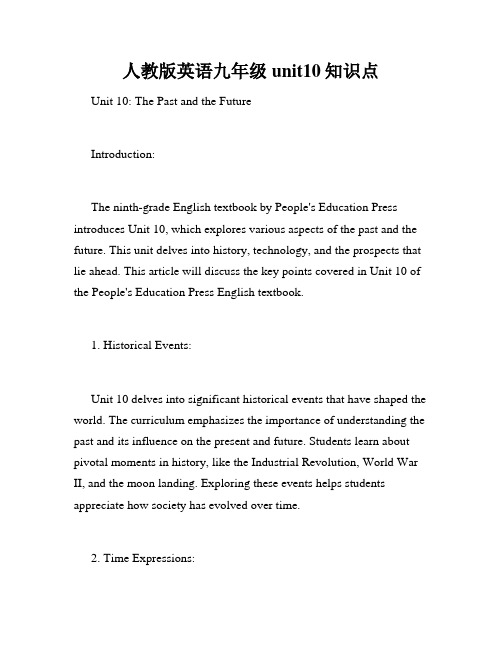
人教版英语九年级unit10知识点Unit 10: The Past and the FutureIntroduction:The ninth-grade English textbook by People's Education Press introduces Unit 10, which explores various aspects of the past and the future. This unit delves into history, technology, and the prospects that lie ahead. This article will discuss the key points covered in Unit 10 of the People's Education Press English textbook.1. Historical Events:Unit 10 delves into significant historical events that have shaped the world. The curriculum emphasizes the importance of understanding the past and its influence on the present and future. Students learn about pivotal moments in history, like the Industrial Revolution, World War II, and the moon landing. Exploring these events helps students appreciate how society has evolved over time.2. Time Expressions:A crucial part of learning any language is understanding how to express time accurately. Unit 10 of the textbook introduces various time expressions, such as "in the past," "in the future," "just now," and "for a long time." Students learn how to use these expressions in sentences, allowing them to effectively communicate their thoughts and experiences regarding time frames.3. The Tenses:Unit 10 revisits and expands upon the study of tenses. The past, present, and future tenses are explored in greater detail. Students learn how to construct sentences in each tense, helping them become more proficient in expressing themselves accurately. Additionally, they learn about the differences between simple, continuous, and perfect tenses, enhancing their understanding of English grammar.4. Technological Advances:The modern world is heavily influenced by technological advancements. Unit 10 focuses on significant technological achievements throughout history and predictions about the future. Students study revolutionary developments such as the invention of thetelephone, the internet, and artificial intelligence. They also speculate on future technologies, examining possibilities like virtual reality and renewable energy sources.5. Conditional Sentences:Conditional sentences are essential for expressing hypothetical situations or outcomes. Unit 10 introduces various types of conditionals, including zero, first, second, and third conditionals. Students learn how to construct these sentences accurately and use them to express their thoughts about past and future possibilities. Mastering conditional sentences enhances their language skills and enables them to communicate complex ideas effectively.6. The Past and Future in Literature:Literature often explores themes related to the past and future. In Unit 10, students are exposed to famous works of literature that touch upon these themes. They read excerpts from classic novels and poems and analyze the authors' perspectives on time and historical events. This exercise not only fosters language skills but also cultivates critical thinking and literary appreciation.Conclusion:Unit 10 of the People's Education Press English textbook provides ninth-grade students with a comprehensive understanding of various aspects related to the past and the future. From historical events to time expressions, tenses, technological advances, and literature, this unit introduces valuable knowledge and language skills. By studying these topics, students can develop a broader perspective on the world and enhance their language proficiency.。
人教新目标英语九年级unit10知识点总结
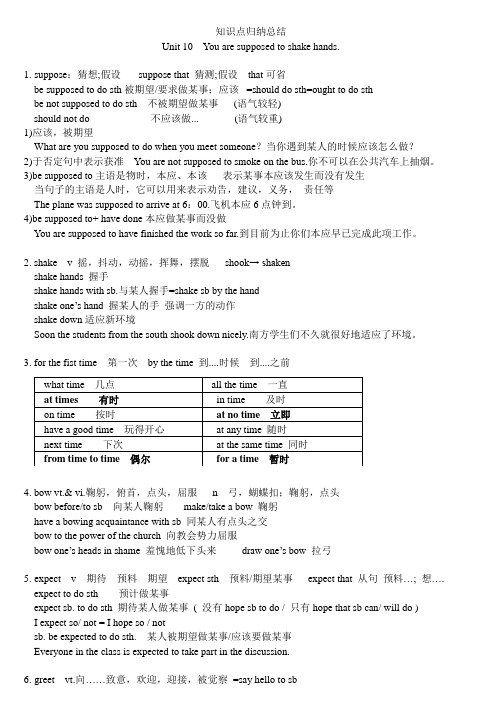
知识点归纳总结Unit 10 You are supposed to shake hands.1.suppose:猜想;假设suppose that 猜测;假设that可省be supposed to do sth被期望/要求做某事;应该 =should do sth=ought to do sthbe not supposed to do sth 不被期望做某事(语气较轻)should not do 不应该做... (语气较重)1)应该,被期望What are you supposed to do when you meet someone?当你遇到某人的时候应该怎么做?2)于否定句中表示获准You are not supposed to smoke on the bus.你不可以在公共汽车上抽烟。
3)be supposed to主语是物时,本应、本该表示某事本应该发生而没有发生当句子的主语是人时,它可以用来表示劝告,建议,义务,责任等The plane was supposed to arrive at 6:00.飞机本应6点钟到。
4)be supposed to+ have done本应做某事而没做You are supposed to have finished the work so far.到目前为止你们本应早已完成此项工作。
2. shake v 摇,抖动,动摇,挥舞,摆脱s hook→ shakenshake hands 握手shake hands with sb.与某人握手=shake sb by the handshake one’s hand 握某人的手强调一方的动作shake down适应新环境Soon the students from the south shook down nicely.南方学生们不久就很好地适应了环境。
3. for the fist time 第一次by the time 到....时候到....之前4. bow vt.& vi.鞠躬,俯首,点头,屈服n 弓,蝴蝶扣;鞠躬,点头bow before/to sb 向某人鞠躬make/take a bow 鞠躬have a bowing acquaintance with sb 同某人有点头之交bow to the power of the church 向教会势力屈服bow one’s heads in shame 羞愧地低下头来draw one’s bow 拉弓5.expect v 期待预料期望expect sth 预料/期望某事expect that 从句预料…; 想…. expect to do sth 预计做某事expect sb. to do sth 期待某人做某事( 没有hope sb to do / 只有hope that sb can/ will do )I expect so/ not = I hope so / notsb. be expected to do sth. 某人被期望做某事/应该要做某事Everyone in the class is expected to take part in the discussion.6.greet vt.向……致意,欢迎,迎接,被觉察=say hello to sbgreet each other with a smile互相微笑致意greet sb with a shower of stones.向某人投掷雨点般的石子greet sb. the wrong way7. as soon as 一…就…引导时间状语从句,主将从现Your uncle will come to see you as soon as he arrives here.I’ll tell him as soon as I see him.8.hold out ones` hand 伸出(手)hold on 抓住; (打电话时用语)别挂断...hold on to 坚持; 不放弃hold on to your dreams hold up 举起9.be relaxed about sth. 对…..宽松;对….随意不严格They are relaxed about the time. 他们对时间很随意。
人教版九年级全一册英语Unit10重点语法知识点总结
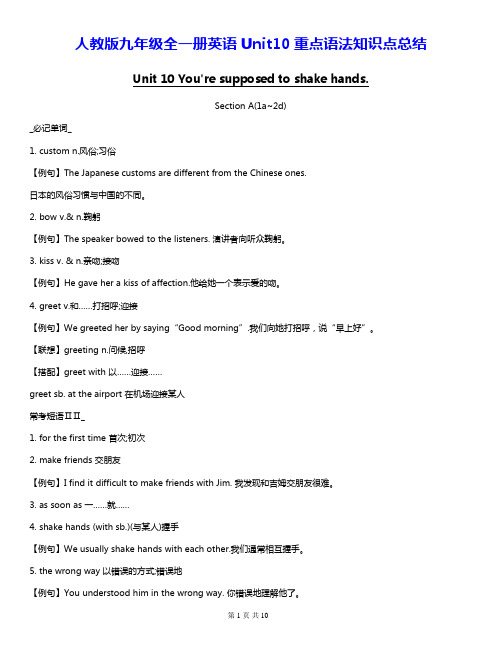
人教版九年级全一册英语Unit10重点语法知识点总结Unit 10 You're supposed to shake hands.Section A(1a~2d)_必记单词_1. custom n.风俗;习俗【例句】The Japanese customs are different from the Chinese ones.日本的风俗习惯与中国的不同。
2. bow v.& n.鞠躬【例句】The speaker bowed to the listeners. 演讲者向听众鞠躬。
3. kiss v. & n.亲吻;接吻【例句】He gave her a kiss of affection.他给她一个表示爱的吻。
4. greet v.和……打招呼;迎接【例句】We greeted her by saying“Good morning”.我们向她打招呼,说“早上好”。
【联想】greeting n.问候,招呼【搭配】greet with 以……迎接……greet sb. at the airport 在机场迎接某人常考短语ⅡⅡ_1. for the first time 首次;初次2. make friends 交朋友【例句】I find it difficult to make friends with Jim. 我发现和吉姆交朋友很难。
3. as soon as 一……就……4. shake hands (with sb.)(与某人)握手【例句】We usually shake hands with each other.我们通常相互握手。
5. the wrong way 以错误的方式;错误地【例句】You understood him in the wrong way. 你错误地理解他了。
6. hold out 伸出(手等)7. greet each other 互相问候8. to one’s surprise 令某人惊讶的是经典句型ⅢⅡ1. That's how people in Japan are expected to greet each other.那就是在日本人们互相问候的方式。
人教版九年级英语第十单元知识点总结(推荐文档).doc
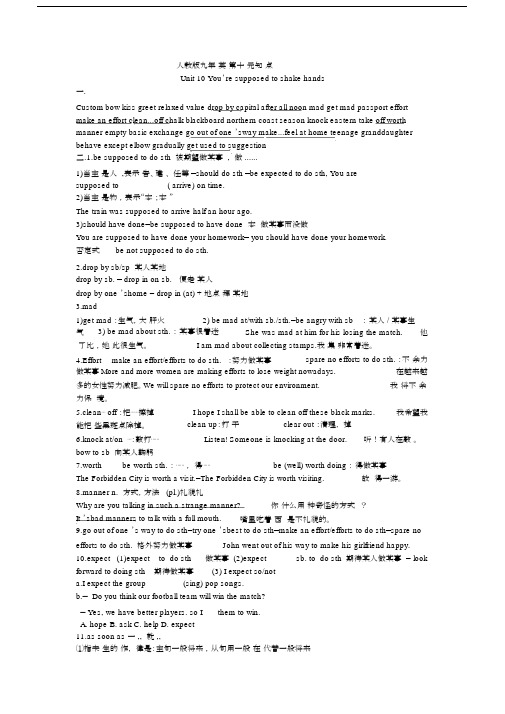
人教版九年英第十元知点Unit 10 You’re supposed to shake hands一.Custom bow kiss greet relaxed value drop by capital after all noon mad get mad passport effort make an effort clean...off chalk blackboard northern coast season knock eastern take off worth manner empty basic exchange go out of one ’sway make...feel at home teenage granddaughter behave except elbow gradually get used to suggestion二.1.be supposed to do sth 被期望做某事 ,做 ......1)当主是人 ,表示告、建、任等 =should do sth =be expected to do sth, You aresupposed to___________( arrive) on time.2)当主是物,表示“本;本”The train was supposed to arrive half an hour ago.3)should have done=be supposed to have done 本做某事而没做You are supposed to have done your homework= you should have done your homework.否定式be not supposed to do sth.2.drop by sb/sp 某人某地drop by sb. = drop in on sb. 便走某人drop by one ’shome = drop in (at) + 地点拜某地3.mad1)get mad :生气,大肝火2) be mad at/with sb./sth.=be angry with sb :某人 / 某事生气3) be mad about sth. :某事很着迷She was mad at him for his losing the match. 他了比,她此很生气。
人教版九年级英语unit10知识点
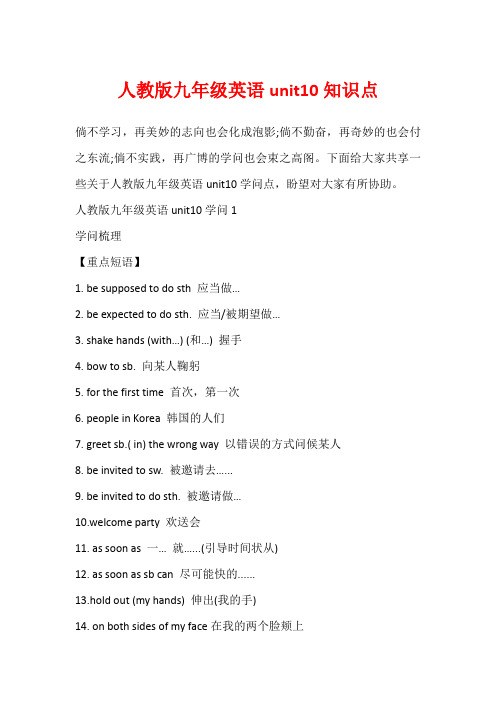
人教版九年级英语unit10知识点倘不学习,再美妙的志向也会化成泡影;倘不勤奋,再奇妙的也会付之东流;倘不实践,再广博的学问也会束之高阁。
下面给大家共享一些关于人教版九年级英语unit10学问点,盼望对大家有所协助。
人教版九年级英语unit10学问1学问梳理【重点短语】1. be supposed to do sth 应当做…2. be expected to do sth. 应当/被期望做…3. shake hands (with…) (和…) 握手4. bow to sb. 向某人鞠躬5. for the first time 首次,第一次6. people in Korea 韩国的人们7. greet sb.( in) the wrong way 以错误的方式问候某人8. be invited to sw. 被邀请去…...9. be invited to do sth. 被邀请做…10.welcome party 欢送会11. as soon as 一… 就…...(引导时间状从)12. as soon as sb can 尽可能快的......13.hold out (my hands) 伸出(我的手)14. on both sides of my face在我的两个脸颊上15. be from= come from 来自16. be relaxed about 对…放松/随意17. a bit/ little late 晚一点18. value the time we spend with sb珍惜我们与某人度过的时间19.in our everyday lives 在我们的日常生活中20. drop by 顺便探望,随意进入21. make plans ( to do sth.) 打算做某事22. plan to do sth.打算做某事23. on the side of the face在脸的一侧24. the town center 在城镇中心25. as many as sb can = as many as possible 尽可能多的…26. be on time 守时27. the capital of clocks and watches钟表之都28. after all 终归,终归29. at noon 在中午30. 15 minutes late 迟到15分钟【重点句型】1. He should have told me about it.他本应当把这件事告知我。
- 1、下载文档前请自行甄别文档内容的完整性,平台不提供额外的编辑、内容补充、找答案等附加服务。
- 2、"仅部分预览"的文档,不可在线预览部分如存在完整性等问题,可反馈申请退款(可完整预览的文档不适用该条件!)。
- 3、如文档侵犯您的权益,请联系客服反馈,我们会尽快为您处理(人工客服工作时间:9:00-18:30)。
Unit10 You're supposed to shake hands.重点短语句子重难点解析1. That's how people in Japan are expected to greet each other.这就是在日本人们应该互相问候的方式。
⑴greet v. 问候,打招呼;迎接(= welcome / say hello to )常与with ... 或by doing ...搭配,表示“以…方式问候/打招呼”It's a friendly way to greet each other. 这是一种互致友好问候的方式。
She rose to greet her guests. 她起身迎接客人。
⑵expect sb. to do sth. 期望某人做某事 be expected to do sth. 被期望某事His parents expect him to see them in a short time. 父母期望他马上来看望他们。
She is expected to finish the job on time. 期望她按时完成工作。
※练一练① The host ________________________ at the gate. 主人在大门口迎接我们。
② He _______________________________ "good morning". 他向她打招呼说 “早上好”。
③ She _________________________ a friendly smile. 她向我微笑致意。
1. for the first time 第一次2. the first time ... 第一次……3. be supposed to do sth. 应该做某事4. be expected to do sth. 被期望做某事5. shake hands with sb. 和某人握手6. hold out 伸出7. to one's surprise 令/使某人意外的是8. be relaxed about ... 对……感到放松9. rush around 匆忙赶路10. value the time 珍惜时间11. in one's everyday life 在日常生活中12. drop by 顺便拜访;随便进入13. after all 毕竟、终究14. get mad with sb. 生某人的气15. make an/every effort to do sth. 努力做某事16. heavy traffic 繁忙的交通17. It's no big deal! 小事一桩!18 clean ... off 把……擦掉19. be worth doing 值得做20. table manners 餐桌礼仪 21. stick ... into ... 把……伸进…… 22. take off 脱下;(飞机)起飞 23. as ... as possible 尽可能…… 24. be worth the trouble 值得麻烦 25. point at 指着(侧重对象) 26. point to 指向(强调方向) 27. go out of one's way to do sth. 特地/努力做某事 28. make sb. feel at home 使……感到宾至如归 29. be comfortable doing sth. 自在地做某事 30. feel good about doing sth. 对做某事感觉良好 31. behave well / badly 表现好/不好 32. good / bad behavior 良好/恶劣举止 33. Chinese customs 中国的习俗 34. at the table 在桌上 35. at table 就餐 36. show up 出现;显现;赶到;使……出丑 37. show off 炫耀;显摆 38. show sb. around sp. 带某人参观某处2. Where I'm from, we are pretty relaxed about time. 我来的那个地方对时间非常放松。
⑴where+从句(……的地方)where引导地点状语从句,说明主句行为发生的地点。
Just stay where you are. 就留在你原来的地方。
Where there is a will, there is a way. 有志者,事竟成。
⑵be relaxed about ... 对……感到放松Take it easy, just be relaxed about the interview. 别紧张,轻松面试。
※练一练①Go back where ________________________ . 你从何处来到何处去。
②We must camp ______________________________ . 我们必须在能找到水的地方露营。
③You just ______________________________ this examination.你只需要放松地面对考试就可以。
3. We value the time we spend with our family and friends in our everyday lives.我们重视日常生活中和家人、朋友在一起的时光。
⑴value v. 珍惜;重视⑵in one's everyday life 在日常生活中①I've always ____________________________________ . 我一直很重视老师们所给的建议。
②Many people make different kinds of friends _________________________ (在他们的社交生活中).4. We often just walk around the town center, seeing as many of our friends as we can.经常我们只是到市中心四处走走,尽可能多的见见我们的朋友。
句中seeing……,属于现在分词短语作伴随状语。
伴随状语:指伴随着句子谓语动词的动作而发生或存在另一的动作或状态,即同一个主语发出两个动作或处于两种状态。
The dog entered the room, following the boy.这条狗跟着男孩进了屋。
(现在分词作伴随状语,表主动。
)The boy entered the room, followed by his dog.男孩进了屋,后面跟着他的狗。
(过去分词作伴随状语,表被动。
)※练一练①They walked around the town, ________________________________ (开心地说着笑着).②He was lying on the sofa _____________________. 他躺在沙发上看电视。
5. We're the capital of clocks and watches, after all!after all 毕竟;终究;到底★放在句首时,用来提醒对方别忘记或忽略某个重要的事实或理由。
So you see I was right after all! 你看,毕竟还是我对吧!After all, she's a big girl now. 毕竟,她现在是大姑娘了。
6. So I make an effort to be on time when I meet my friends. 因此我在见朋友时都努力做到守时。
make an effort to do sth. 努力做……You should make an effort to learn something new everyday. 我们必须努力去每天学一点新东西.※练一练①I will ___________________________________________ . 我要尽力戒烟。
②You should ______________________________ your reading ability. 你应该努力提高你的阅读能力。
7. Also, we never visit a friend's house without calling first. 另外,我们从不事先未通电话便登门拜访朋友。
★never和without是双重否定句,合在一起表达肯定意义。
You will hardly ever be able to speak good English without practicing.你不练习几乎是不可能把英语学好的。
8. They go out of their way to make me feel at home. 他们特意使我觉得舒适自在。
⑴go out of one's way to do sth. 特别费心地做……;努力做……If you are in trouble, I will go out of my way to help you. 如果你遇到麻烦我会尽全力帮助你。
⑵make sb. feel at home 使某人感到宾至如归/无拘无束/自由自在Good hotel service will make guests feel at home. 好的旅馆服务让游客有宾至如归的感觉。
※练一练①约翰想方设法使他的女朋友高兴。
John _________________________________ his girl friend happy.②我在尽我一切所能使他们感到宾至如归。
I'm doing everything I can to ___________________________.9. You wouldn't believe how quickly my French has improved because of that.你绝不会相信就因为这样我的法语提高得有多快。
常用句式:You wouldn't believe ……你无法想象/你想都想不到/你绝不会相信……表示所陈述的事情超出想象之外,类似的表达有You would never / hardly believe……。
